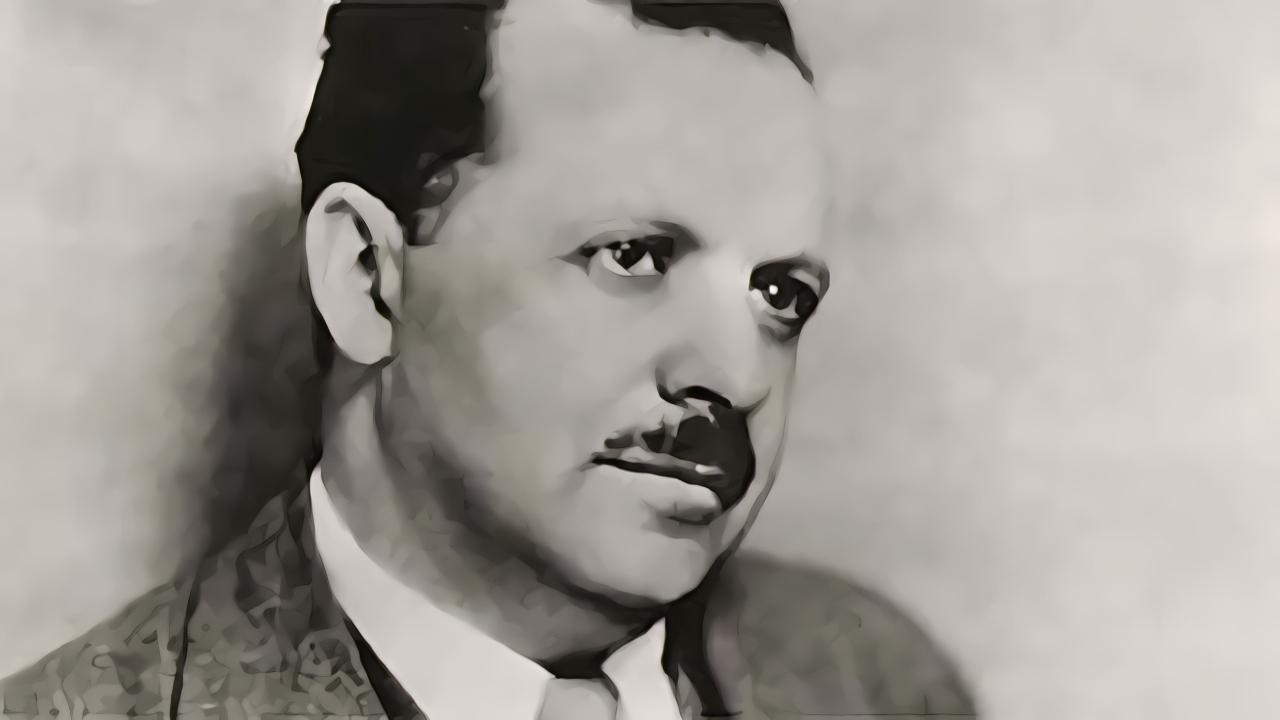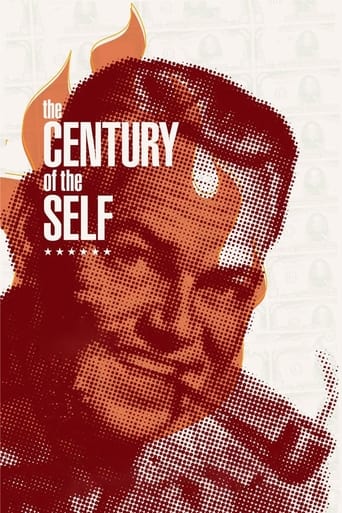Interesteg
What makes it different from others?
CrawlerChunky
In truth, there is barely enough story here to make a film.
Zandra
The movie turns out to be a little better than the average. Starting from a romantic formula often seen in the cinema, it ends in the most predictable (and somewhat bland) way.
Fleur
Actress is magnificent and exudes a hypnotic screen presence in this affecting drama.
isaacroccoco
Adam Curtis documents the rise of consumer culture, public relations, propaganda and advertising. The main focus is Edward Bernays, Sigmund Freud's nephew who used his uncle's behavioral theories in his advertising, public relations, and propaganda business. He was also hired by the US to soften public resistance to entering WWI. In 1928 Bernays wrote a book called "Propaganda" and its first paragraph should be all you need to read to want to watch this documentary;"The conscious and intelligent manipulation of the organized habits and opinions of the masses is an important element in democratic society. Those who manipulate this unseen mechanism of society constitute an invisible government which is the true ruling power of our country."Got that? That was in 1928, His methods have since evolved into predictable science.
alistair_deacon-1
The Century of the Self is a thought provoking, four part documentary describing how Freudian and post-Freudian ideas about human nature were adopted by corporations and politicians to manipulate society and public values in the 20th Century. There is a particular focus on the influence of Edward Bernays, the inventor of public relations, on American culture, business, and politics. This is a well crafted, engagingly paced, and consistently interesting documentary, and has developed a bit of a cult following.This documentary is a bit overly simplistic and tries to fit the messy reality of history into neat little boxes. It gives far too much credit to Freud and his followers, failing to acknowledge that Freud's ideas, even by the 1970s, had been largely discredited and dismissed by the psychological community. The idea of an individual was not new to the 20th Century (let alone Freud or his successors), nor was the idea that most human beings are irrational simpletons (or worse) who must be manipulated and led around by the nose through appeals to their basest emotions and desires, but The Century of the Self tells us that these were revolutionary new ideas and concepts. One didn't need to be a Freudian to come up with advertising that, for example, shows a pretty woman in a short skirt sucking on a tubular popsicle and saying, "Oooh what an exciting man you are!" to a man in a flashy new convertible, but the documentary implies that pretty much all of advertising and public relations until the 1960s was driven by Freudian theories about human nature and the unconscious mind.An embarrassingly ironic note is struck throughout with the use of mood music prompts to indicate to viewers what values they should attribute to different organizations and ideas, such as by playing foreboding, negative music whenever corporations are mentioned by the narrator. This becomes quite absurd in the context of what is basically an extended criticism of attempts by advertisers and politicians in the 20th Century to influence public sentiment through manipulative emotional prompting rather than honest information and debate about ideas.Those criticisms aside, The Century of the Self is a good watch and filled with interesting information and insights.
Sandsquish
The Century of the Self contrasts whimsical film footage with an ominous narrative. It describes the way our ideas about human nature have changed and how the development of psychology has allowed social institutions to use these ideas to exert more and more control over people. This documentary focuses its attention on Sigmund Freud's family, especially his daughter and nephew, who exerted a surprising amount of influence on the way corporations and governments throughout the 20th century have thought about, and dealt with, people.At the end of the 19th century, Freud had a remarkable insight into human behavior. He believed that people were, often, unaware of what motivated them and didn't really know how they felt about things. He called this part of the mind, the part that people couldn't recognize, the subconscious. Being the cynic he was, Freud decided that the unconscious was filled with irrational, destructive, emotions which posed a danger to society. This was, unsurprisingly, a very unpopular point of view when Freud first wrote about it. At the time, people knew that they were, actually, divinely rational beings who were in complete control of themselves.But Edward Bernays, Freud's American nephew, was a little more receptive to his uncle's ideas, not because he was concerned with whether or not people were naturally destructive, but because Freud's ideas about people having strong emotions might help him convince people to buy things they didn't really need, and make a lot of money for him and his clients in the process. As long as his uncle wasn't completely wrong, then all Bernays had to do was associate emotional ideas with pointless products, and then consumers just wouldn't be able to help themselves. He was right, and his remarkable successes created a new industry, called public relations, which relied, almost entirely, on playing emotional games with people's heads. Worse, the terrifying events, fueled by Freudian propaganda, that began to occur in Germany during the depression convinced politicians that Freud had been even more right than they suspected. People's emotions were clearly dangerous and had to be controlled. Government agencies began using Bernays' PR techniques, and Himmler's propaganda methods, to convince people to suppress their emotions and conform to social norms. Anna Freud, Sigmund's daughter, and one of his most influential evangelists, even decided that she would see to it that her British nephew and niece were raised this way, as an example.However, one of Freud's students, Wilhelm Reich, eventually decided that Freud had been a little paranoid. Emotions weren't bad, people weren't evil, and the solution wasn't control and repression, but expression. Freud's daughter didn't like the sound of this, especially since her nephew and niece had since grown up to be severely troubled adults, providing an unnervingly good proof of his thesis. This Reich guy had struck a nerve, and so she ostracized him from the psychology movement. But Reich's ideas still caught on. And this didn't make either industry or government any happier than Anna. Neither of them knew what to do with the individuals that self-expression created. They had mass-produced products and policies that they sold through massive public-relations campaigns. Then, they noticed that self-expression gurus were organizing "focus groups" where people met to work out how they felt about things. All these institutions had to do was ask these focus groups the right questions, and they'd tell them how to sell people more products and policies than they had ever imagined possible. It turned out that all business and government really had to do was categorize people according to their emotional development and social attitudes and then play each category off of one other. Corporations could sell slight variations of the same mass-produced products to people, as long as they associated one variation with one group of people, and then convince them that this variation allowed them to express their true nature. And politicians no longer had to worry about sweeping social changes, they could just play off one segment of voters against another and then sit back and watch all the consumers obsessively buy things, oblivious to social problems. Documentarian Adam Curtis' bewildering collage of film clips, pop-music snippets, and interviews helps portray the slightly absurd and surreal cynicism and manipulation practiced by the 20th-century's supposedly enlightened business and political leaders.
hlyen
Caught this fantastic documentary at Cinema Village in NY. In short, it traces the tremendous influence of Freudian ideas and the family Freud - Siggie, Anna, and nephew Edward Bernays - on the development contemporary capitalist societies.Using chilling footage and lucid voice over, it traces the methods by which Freud's discoveries about the sub/unconscious mind were systematically implemented by corporate America in the 1920's and later the U.S. government to increase their wealth/power while at the same time giving people the impression of greater personal freedom. It was Bernays who founded the 1st public relations firm and coined the term "engineering consent".Its thesis spans everything from the invention of public relations, modern advertising techniques, Nazi Germany, CIA brainwashing, the self-help movement, consumer culture and current U.S./British electoral politics. All of which have direct antecedents in the ideas of Freud.Apparently, due to lack of copyright clearances, it is not available on DVD or tape. But hopefully it will make the art house circuit. His follow-up, The Power of Nightmares, is supposedly even better. It deals with 9-11.More comprehensive and persuasive than "The Corporation" and more objective and grounded that Michael Moore's work, "Century of the Self" is essential viewing. If you think corporate and government collusion in controlling the masses is tin hat stuff, well, start measuring your head...

